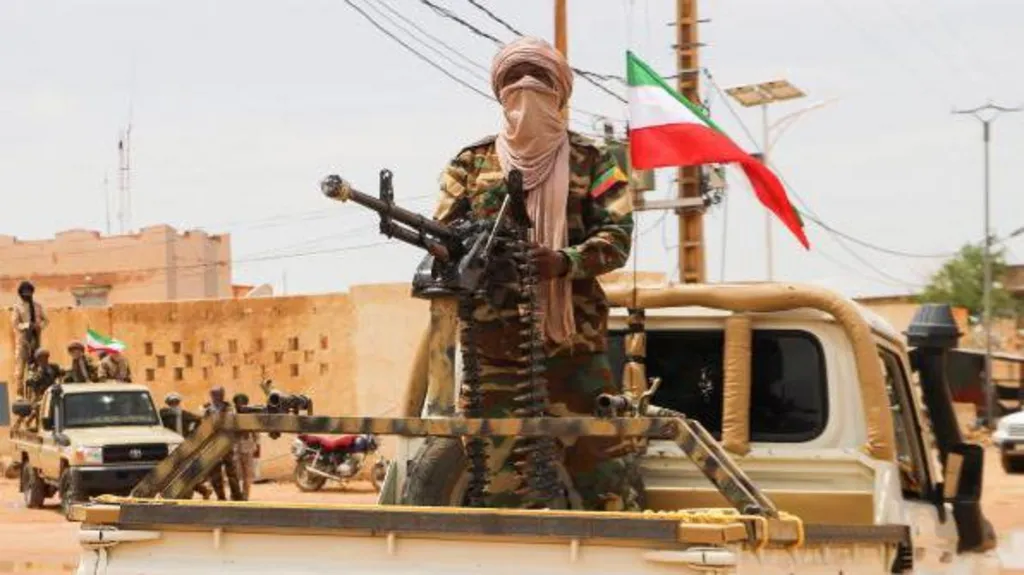Ukraine Denies Allegations of Drone Support to Mali Rebels
3 min read
The Malian army has been unable to quell unrest by rebels fighting in the north

The Malian army has been unable to quell unrest by rebels fighting in the north
Ukraine has firmly denied accusations of supplying drones to rebels in Mali, who are engaged in conflict against the Malian army and Russian-backed mercenaries. The denial follows a report from Paris-based newspaper Le Monde, which claimed that Ukrainian drones were providing crucial support to the Tuareg rebels, suggesting that Kyiv was offering discreet yet significant assistance.
Mali’s junta-led government has shifted its alliances dramatically in recent years, severing its long-standing partnership with former colonial power France in 2022. This pivot was aimed at combating a persistent insurgency in northern Mali, with the junta increasingly turning to Russia for military support. However, despite these efforts, the Malian government has struggled to contain the unrest, suffering considerable losses alongside its Russian allies.
Amidst these tensions, Mali and neighboring countries, including Niger and Burkina Faso, where military governments also hold power, have accused Ukraine of supporting terrorism in the Sahel region. This came after a Ukrainian official stated earlier this year that Ukraine had extended support to the rebels.
In response, Ukraine’s foreign ministry issued a statement on Monday categorically rejecting these allegations. The ministry emphasized that it “strongly rejects the accusations released by international media regarding our state’s involvement in supplying UAVs [unmanned aerial vehicles] to the rebels in Mali.” It also refuted claims from Malian and Nigerien officials suggesting that Ukraine was arming and providing intelligence to what they described as a “terrorist coalition.”
The statement called for an end to the dissemination of false information that mirrors narratives propagated by Russia. The tension between Mali and Ukraine escalated further when Mali severed diplomatic relations with Ukraine in August, following remarks made by Andriy Yusov, a spokesman for Kyiv’s military intelligence service. Yusov had indicated that the rebels in Mali had “received necessary information” to conduct successful operations against Russian-backed forces.
This assertion gained weight after a deadly confrontation in late July, during which at least 84 Russian-backed fighters and 47 Malian soldiers were killed in clashes with Tuareg separatist rebels and al-Qaeda-linked militants in northern Mali. This event marked one of the heaviest defeats for the Wagner mercenary group, which has since rebranded itself as Corps Africa.
According to Le Monde, after Yusov’s comments, commanders of the Mali rebels were reportedly forced to acknowledge a cooperation with Kyiv that they would have preferred to keep under wraps. While the rebels admitted to having “links” with Ukraine, they were less forthcoming about the source of their drones.
This development highlights the complex geopolitical landscape in the region, where Mali has been seeking to establish closer ties with Russia amidst growing discontent with Western nations, particularly following the invasion of Ukraine by Russia in 2022. As Moscow faces increasing isolation from Western countries, it has been working to expand its influence in Africa, including in Mali, by building political and security alliances.
The situation in Mali continues to be precarious, with a persistent insurgency challenging the authority of the junta-led government. As the Malian military struggles to maintain control, the alleged involvement of foreign powers in the conflict raises serious questions about sovereignty and the implications of external support for rebel groups.
The ongoing conflict also underscores the broader implications of geopolitical alliances in Africa, where historical ties to former colonial powers are increasingly being challenged by new partnerships. As tensions mount, the narrative surrounding foreign involvement in regional conflicts will remain a critical issue, shaping the future of governance and stability in Mali and the Sahel.
With Ukraine’s denial of the allegations and Mali’s shifting allegiances, the landscape in this troubled region remains fraught with challenges. Both countries will likely continue to navigate the complexities of their respective political situations while addressing the underlying issues that fuel conflict and unrest. The evolving dynamics will be closely monitored as the situation develops, with potential repercussions for both regional security and international relations.